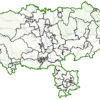A package of measures aimed at ensuring that North Yorkshire County Council remains on track to achieve millions of pounds in savings as a result of Government funding cuts is to be considered by the authority’s Executive next week.
The proposals, which will be forwarded to the full council for ratification if approved by the Executive, include a review of the criteria for access to adult social care, reductions in subsidies for public transport, a review of charges for some social care services, charging for certain services provided at Household Waste Recycling Centres, and a review of transport arrangements for students over the age of 16 attending schools and colleges.
The county council is committed to saving £92m in the four years ending on 31 March, 2015. It has warned that, following recent announcements by the Government over future funding, it will need to find a further estimated £66m between 2015 and 2019.
The major savings proposals for 2014-15, (all of which are subject to a public consultation process) which will be considered by the Executive next Tuesday (9 July 2013) are:
- Social care criteria. North Yorkshire is one of only a handful of authorities in England and Wales which makes social care support available to people judged to have “moderate” needs; 87% of authorities intervene when needs are assessed as “substantial.” The proposal is that North Yorkshire will join the majority of authorities in offering services to people with “subtantial” needs or higher.
- Fairer contributions. At present, most but not all community-based social services are provided on a means-tested basis. The proposal is that in future all such services would be paid for, although still on a means-tested basis to ensure people who cannot afford to pay would still receive the support they need.
- Public Transport. The county council spends some £4.4m a year on subsidising the 20% of bus journeys which are not commercially viable. The proposal is to review provision with the aim of reducing the subsidies by £1.1m. In assessing the options, a strategy would be adopted of ensuring that as many communities as possible retain a basic bus service to their nearest market town, and that an “inter-urban” network with a minimum set frequency is maintained.
- Household waste recycling services. At present, residents of North Yorkshire are allowed to dispose of construction and demolition material, including soil and rubble, at household waste recycling centres without payment. The cost to the council of disposal of that soil and rubble is £240,000 a year. The proposal is for the introduction of a charge for the disposal of construction and demolition material.
- Post 16 transport. The council is looking at various options to reduce the discretionary cost of post-16 transport to schools and colleges by £400,000 a year, ultimately by implementing changes over a three year period. Students can currently purchase a subsidised pass at a maximum price of £350. The proposal is to work with schools and colleges to continue a subsidy but to reduce the net cost to the authority.

Richard Flinton, Chief Executive said:
Government decisions on the fundng of local government leave us with no alternative but to introduce significant savings to ensure that we continue to live within our means.
We have done everything possible so far to protect front line services, and we shall continue to do so. We have made significant savings in back-office costs and by introducing new ways of working we have found innovative ways of dealing with the financial constraints imposed upon us. But it is inevitable that savings of the magnitude now being demanded cannot be achieved without an impact on the services provided by the council.
Before the current period of austerity began in 2010, the county council spent approximately £500m a year. Since then, the actual and anticipated spending cuts mean the council’s spending power has been reduced by one third.









